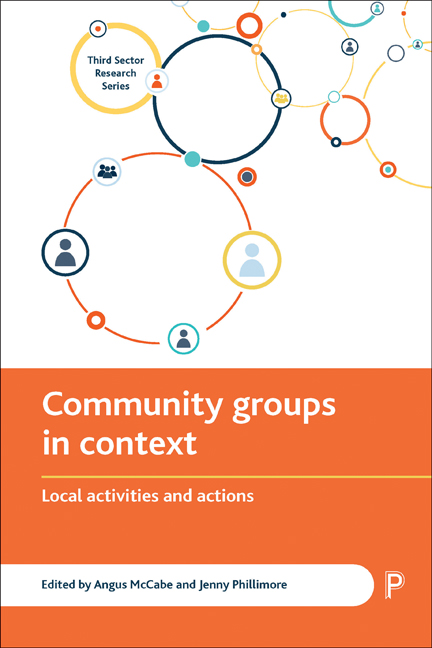Book contents
- Frontmatter
- Contents
- List of tables and figures
- Foreword
- Series editor’s foreword
- Acknowledgements
- Notes on contributors
- Introduction Why get below the radar? The importance of understanding community groups and activities
- Part One Scoping and mapping community actions and activities
- Part Two Community groups and activities in context
- Part Three Under-explored radars
- Part Four Thinking about voice, learning and emotion below the radar
- Index
four - Community as policy: reflections on community engagement, empowerment and social action in a changing policy context
Published online by Cambridge University Press: 05 April 2022
- Frontmatter
- Contents
- List of tables and figures
- Foreword
- Series editor’s foreword
- Acknowledgements
- Notes on contributors
- Introduction Why get below the radar? The importance of understanding community groups and activities
- Part One Scoping and mapping community actions and activities
- Part Two Community groups and activities in context
- Part Three Under-explored radars
- Part Four Thinking about voice, learning and emotion below the radar
- Index
Summary
Chapter aims
Drawing on policy and related academic literature, this chapter aims to provide an overview of:
• the changing meanings of community and the power of community in policy discourse;
• the expectations placed on communities and community groups to deliver on a range of policy agendas;
• the capacity, and willingness, of community groups to engage with government agendas.
As such it broadens the debate beyond specific responses to austerity (Chapters Five and Six) to place the idea of below the radar activity both at the centre and the periphery of policy thinking over the past decade.
Background
In a Cabinet Office press release (5 August 2010) not long after the election of the UK's coalition government, the communities secretary, Eric Pickles, announced ‘Today we are turning Government upside down’ by returning decision making to the local, ‘nano’, level. At the same time, the minister for the Cabinet Office argued that ‘Big Society’ was to be a radical departure from the previous government's policies in that it was ‘a real cultural shift’ and an end to ‘big Government, just tweaking things at the centre of power’.
Beyond government, there was, after the 2010 election, recognition by academics and commentators that:
Bottom-up and community-led activities which so often bubble along under the radar are receiving new public recognition. This is in part because we are on the threshold of political change and deep economic restraint … [but also] taps into a powerful tradition of mutualism, co-operatives and the social economy – a tradition which straddles different ideological standpoints. (Oppenheim et al, 2010, p 2)
The coalition, in the early days, presented Big Society as an opportunity to reframe the relationship between government and communities. The term ‘third sector’, which, under New Labour, assumed a cohesive and coherent entity, gave way to the more fluid terminology of civil society. Community engagement all but disappeared from policy discourse in favour of an apparently more dynamic ‘social action’. Regeneration, as personified by the plethora of Area Based Initiatives post-1997, and criticised as a series of top-down, target-driven directives that frequently failed to empower communities (Lupson, 2003), were to be replaced by community-led, or community-driven, change: ‘creating more responsible and active communities where people play a part on making society a better place’ (Maude and Hurd, 2010).
- Type
- Chapter
- Information
- Community Groups in ContextLocal Activities and Actions, pp. 71 - 90Publisher: Bristol University PressPrint publication year: 2017



